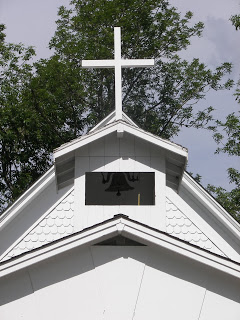When you hear the word “church”, what comes to mind? If you are like me, the first thing that pops into your head is the picture of a building like the one above. You think of the tall windows, the steeple, or simply the building you enter into on a semi-regular basis, or the one you would never set foot in. You think of sermons, Vacation Bible Schools, and potlucks set out on long tables with children running underfoot. You might think of an organ, of an older congregation, of the collection plate being passed around while a hymn is sung. I think of all these things yet at the same time realize only some of them truly constitute the “church”.
What is the church? This is the question many people have been asking for the thousands of years. Though the question is timeless, I have found myself in conversations with other young adults and some older all wondering if church should have a different emphasis. They have seen churches is operation and have started to question their intent and purpose. They have seen the business meetings, the gatherings, the numbers dwindling in more traditional congregations, and have asked themselves why. In the last few decades, some Christians have moved into the larger “mega-churches” and others have started moving toward the other end of the spectrum, house churches. They don’t like the huge mega-church where they feel lost in the crowd and others love all the opportunities a large church can provide.
But what are house churches? House churches are small groups of people who meet in homes instead of more traditional settings and though they have always been in existence throughout our history, they are most certainly rising in number among mainstream Christians today, even outside of persecuted areas where house churches usually flourish. And people have started to notice and are openly asking questions not often heard before, questions comparing the house churches to their lager counterparts up the street. I’m not saying one type is better than another. Both types of church have benefits and drawbacks. After all, the church is not the building but the people and a large group of people can do great good. However, sometimes we can get so caught up in running a big church, that running it becomes our sole focus. A small house church can act quickly but on the downside, can more easily lose theological diversity.
In different times in my life, I have been a part of churches of many sizes. I grew up in a church of 1,000-2,000 and I thrived in that congregation. I had great Sunday school teachers complete with flannel story boards and crafts, day-camps in the summer, and when I was in high school, we had our own choir that toured for two weeks every summer giving concerts and doing ministerial work around the western United States. I remember being surrounded by missionary displays in the lobby and a strong emphasis being placed on honestly talking to God and standing up publicly, willing to share one’s story. This church was far, far, from perfect, but it did it’s job shaping me in ways that have characterized my faith and the expression thereof, ever since.
As I grew older, I have taken part in other, more mid-size churches of several hundred, attended their business meetings, seen them at work, and though I can name some of their more outward-focused ministries, I can tell you as an adult that for the large part, these churches, including the one I grew up in, were more concerned about continuing the church than being the church. One of my favorite movies, “The American President” puts this admission beautifully when the president testifies, “I was so busy keeping my job, I forgot to do my job.”
How many churches are so busy keeping their buildings, their way of life, that they have forgotten to be the church? After all, Abraham was not chosen to bless himself but to be a blessing to others. The church is the same. We are to be God’s hand in the world lifting up the lives of others, easing burdens, bringing light to dark places, being a blessing to those around us. The good news should be good not just for ourselves, but our lives should be good news for everyone we know and don’t know. We are to have our hands in the muck, we are to get dirty, to spend more time in ministry outside the building than within it.
It is this belief that has led many to start questioning, asking themselves if a large building is the wisest investment, if a house-church would be a wiser use of resources. In a house church there is little overhead, more money and time available with which to reach out.
I am currently a part of two churches. One, though a small congregation, rents space to meet in on a weekly basis including the occasional use by other groups, and we have difficulty meeting the bills most months. Most of our budget goes to rent. The other, a house church, meets in people’s homes on a rotating basis of several weeks. That group has also had trouble raising funds, funds that are usually given to people who need financial help for various reasons, either in our group, or friends of friends. The first church is well known among the Quakers and it has been important to have a regular meeting place for visitors to come to. The house church, not well known outside our own circle of a few other house churches, has more a focus on people’s ministries outside our group as well as a strong community within it.
I wish I could take a simple stand that house churches are the way to go,urging us all to take the less encumbered way, to walk a more community-based road and not taking so much a orientation toward business. But I can’t. Neither can I say more traditional churches with their structure, wider connections, and more resources are the way to go as a church. Both have great benefits and both can fall into great chasms of misdirection. In fact, they can both become just as inward focused, both as concentrated on continuing themselves as a group instead of living out right relationships with God, others, and the earth. Both can place their own goals above the Lord’s. Both churches can also become so outward focused they forget to have community with one another, continuing to share refreshment and community with those who take part.
Still, the conversation begs the question we all need to ask no matter what church we take part in. How much of our efforts are focused on keeping the church and how much are focused on being the church? I am sure, when all is said and done, only the efforts with the end result of being the church will matter. If at the end of the day, all we have done is kept the church, we will have lost what church is all about.



Sarah
I'd like to put a quote from Hope in the Night into my email signature. I'll credit it and link it to this blog and to the sales page for Spirit Rising.
Is that OK? I can give you more info if you reply to me at ajaxhatcher AT yahoo
Jay T.
Excellent post. I suspect the problem is not so much with which type of churc organization we're a part of as much as it's a problem of humanity. There's something in the human heart that is drawn to sameness and being part of a group that is comfortable and protects from the forces without. We as Christians need to remember our purpose for being. I suspect when we do that and are intentional about it, it won't matter what type of church we're a part of; we'll truly be about our Father's business.
From a Friends Meeting perspective… I'm inclined to say we should worship (frequently and long!) in 'house churches' aka "worship groups" and get together in larger groups "Monthly( & larger) Meetings" for business and encountering a larger pool in which to fish for the 'like-minded,' people drawn to unusual concerns and interests.
A problem we have encountered in house churches occurs when the house church meets for a long time at one particular residence. The hosts too easily come to feel that they "own" the meeting which is held in their home. This sense of one family "owning" the meeting tends to have disastrous consequences. It seems that issues of power and control are particularly difficult for house churches, and even for small churches that meet in a public place. Bill Rushby